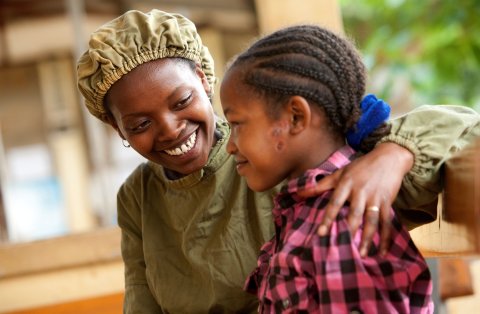Dr Socé Fall: Reflecting on a Year of Triumphs and Challenges at the Helm of the Global NTD Programme

As we celebrate World NTD Day, Dr Ibrahima Socé Fall, WHO Director for Neglected Tropic Diseases, looks at what 2023 meant for Neglected Tropical Diseases and looks ahead at what the next year will bring.
As we reach World NTD Day again, I find myself reflecting on my inaugural year as Director of the Global Neglected Tropical Diseases (NTD) Programme. It's been a year that has profoundly demonstrated the incredible power of collaboration and partnership in the fight against NTDs. Witnessing the progress of 50 countries eliminating at least one NTD has been a landmark achievement towards our collective goals. Yet, it also brings into sharp focus the enduring challenges and the vital work that lies ahead.
Our journey this year was marked by significant events, notably the partners meeting in June 2023. This gathering was more than a meeting; it was a vibrant testament to the commitment and dedication that fuels our community. The insights and discussions that emerged from this meeting have been instrumental in shaping our strategies and reinforcing our united front against NTDs.
December brought another milestone with the RLM Forum. The enthusiasm and passion within the NTD community were palpable. This forum wasn't just an event; it was a celebration of innovative ideas and a testament to the dynamic nature of our collective efforts, fostering deeper connections among all stakeholders.
As we look towards 2024, our focus remains unwavering: to enhance collaboration and spur innovation. The challenges and solutions in our interconnected world are complex, demanding a strategy that not only crosses borders but also embraces the multifaceted nature of NTDs.
Our mission is clear: to break down silos, share resources, and exchange knowledge. Our approach must be holistic, addressing broader community issues alongside specific health challenges. Partnership, as always, is at the core of our mission. Engaging a diverse array of stakeholders, from government bodies to NGOs, community leaders, and those directly affected by NTDs, is crucial for a comprehensive strategy. These partnerships are the bedrock of our efforts, enriching them with diverse perspectives and strengths.
Equity in collaboration is non-negotiable. Voices, especially from NTD-endemic regions, must be central in shaping health strategies. Addressing power imbalances and focusing on local insights and needs is the key to more effective and sustainable solutions.
Innovation and flexibility are the cornerstones of our future success. We must be agile, open to new strategies, tools, and treatments to adapt to the evolving nature of NTDs. Our strategies must be responsive, catering to the specific needs of each region, community, and individual.
Embracing change and maintaining an adaptive mindset are vital as we navigate the shifting landscape of NTDs. We're committed to incorporating new findings and technologies, tackling emerging challenges, and implementing community-driven interventions.
Courage is the final piece of our strategy. We need the bravery to challenge established norms, confront bureaucratic hurdles, explore new territories, and learn from our mistakes. This courage is the catalyst driving our global health efforts.
As we celebrate World NTD Day, I am filled with hope. With our continued efforts in collaboration, partnership, innovation, flexibility, and courage, we are well-positioned to reach our goals and make a significant impact on the lives of those affected by NTDs.
